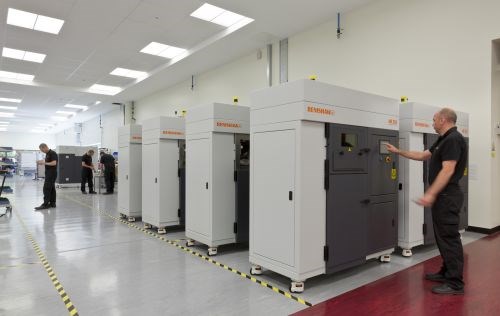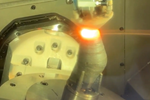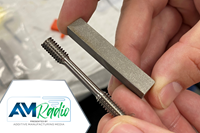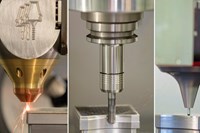Obstacles to the Adoption of Additive Manufacturing
Renishaw was a user of additive manufacturing before it became an OEM supplying additive manufacturing technology—specifically, laser melting systems for producing metal parts. For a metrology company to diversify into additive manufacturing machinery in this way indicates the long-term promise the company sees for this method of manufacturing.
Share
Read Next

Additive manufacturing machine assembly at the Miskin plant.
Renishaw was a user of additive manufacturing before it became an OEM supplying additive manufacturing technology—specifically, laser melting systems for producing metal parts. For a metrology company to diversify into additive manufacturing machinery in this way indicates the long-term promise the company sees for this method of manufacturing.
In the short term, however, there are challenges. Renishaw’s Robin Weston, marketing manager for additive manufacturing products, recently detailed the challenges in a presentation given at the company’s Miskin site, where laser melting machines are produced.
He says the list below comprises the major obstacles that are slowing additive manufacturing’s adoption. In other words, the adoption of additive manufacturing is poised to accelerate, as each of these challenges is confronted and overcome:
Adoption of AM—the challenges today
1. Component redesigns are crucial to the business case for an AM system, because the full value is realized only by parts designed to take advantage of AM.
2. Not enough people are trained yet in designing for AM.
3. Software needs more development. Tools for design for AM are not yet common in CAD packages.
4. AM can bring significant change to distribution and business models based on conventional manufacturing. This could be an unwelcome disruption.
5. AM technologies remain too expensive and too slow. The machine marketplace is still immature.
6. International standards and practices for performance measurement and monitoring must be developed. This will require collaboration and partnerships between competitors, including both users and manufacturers of AM systems.
Related Content
-
Faster Iteration, Flexible Production: How This Inflation System OEM Wins With 3D Printing
Haltec Corp., a manufacturer of tire valves and inflation systems, finds utility in 3D printing for rapid prototyping and production of components for its modular and customizable products.
-
At General Atomics, Do Unmanned Aerial Systems Reveal the Future of Aircraft Manufacturing?
The maker of the Predator and SkyGuardian remote aircraft can implement additive manufacturing more rapidly and widely than the makers of other types of planes. The role of 3D printing in current and future UAS components hints at how far AM can go to save cost and time in aircraft production and design.
-
Dyndrite Joins NMIS to Advance 3D Metal Manufacturing Research
Dyndrite has joined NMIS to help develop build recipes and shareable knowledge in materials process development across all major laser powder bed fusion OEM file formats.

.jpg;width=70;height=70;mode=crop)









.png;maxWidth=300;quality=90)




